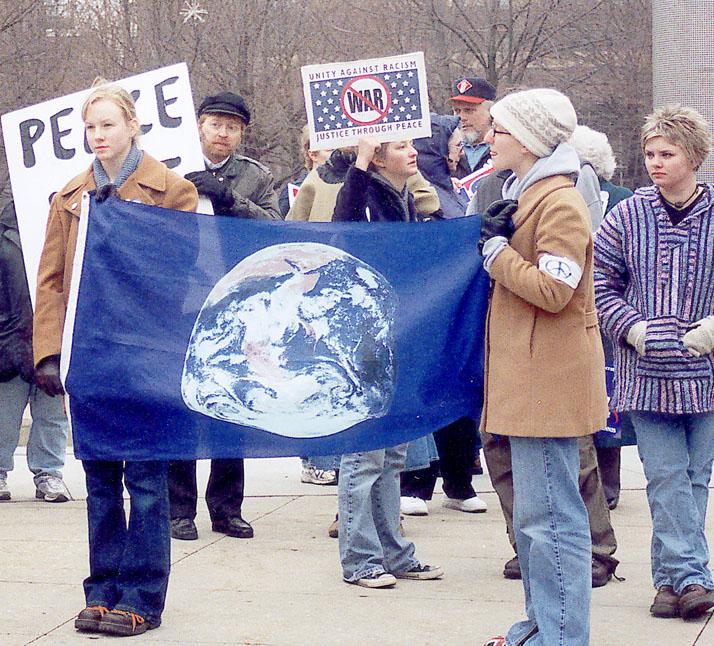Simpson Community reacts to war
March 27, 2003
The campus community may be torn with how to feel about the war in Iraq, but it is united in that everyone will be impacted by it.
Along with the concern of oil supplies, there are countless other areas of uncertainty right now, one of which is the job market.
From an economic standpoint, there is a great deal of good news and bad news, according to Jim Palmieri, associate professor of economics. The good news is that gas prices are not expected to rise for the time being.
“If the conflict stays strictly in Iraq, the impact on gas prices here will be fairly minimal-short in terms of length of time-overall,” Palmieri said.
The reason for this, Palmieri says, it that the United States relies on many countries for its oil supplies, including Venezuela, Mexico and Saudi Arabia; and there is not a heavier focus on the Middle East for this commodity. But, this is not the case for all nations.
“A lot of Europeans, the French, for example, have a much greater financial interest in Iraq than we have,” Palmieri said.
Along with gas prices, the job market is not expected to change very much, according to Palmieri, which is not necessarily good news for job-seeking students.
“It’s a tough job market right now,” Palmieri said. “Technically, we’re not in a recession, but we have very slow growth with unemployment ticking upward.”
Palmieri said that the economic situation is a continuation of what started to happen even before the attacks of Sept. 11, 2001.
“I think the biggest thing that has been dragging the economy down is just the uncertainty of things, in the sense that people don’t know what’s going to happen in Iraq and overseas, so they hold back on spending,” Palmieri said. “Markets don’t like instability or unpredictability, because when consumers worry, that’s difficult for the economy, especially one like ours where two-thirds of our economy is based on consumer spending.”
Still, Palmieri said, the national budget remains strong enough that it should not be heavily hit by the additional military expenditures involved in this war.
“WWII had massive impacts on the U.S. economy, both in terms of output and employment,” he said. “This war in Iraq is not going to have that same level of impact on output or employment. It’s not nearly as big, relative to the size of the economy.”
“We have an economy of around $10 trillion,” Palmieri said. “So, let’s say we spend $40 or $50 billion on this, which is a lot. However, it’s not nearly as much as what we did in WWII-relative to the total budget and output.”
Spiritual responses
Talk of the war in Iraq carries over from classroom discussions into student’s personal conversations and daily lives.
The chapel staff is still in the process of forming ways to be of service to the Simpson community during this time, according to Chaplain Chris Waddle.
“Honestly, we put a lot of our energy into pre-war issues, so now we’re left reeling on how to take action now that the war is here,” said Waddle. “We’re still organizing how to react to this as a pastoral issue and also as a human issue in general, since not everyone shares the same beliefs.”
Soon after the fighting in Iraq started, the chapel took its first step with an inter-faith candlelight vigil. Waddle said that it was important to offer this opportunity for students to reflect. Since then, it has opened up a letter writing campaign for students to communicate with soldiers stationed overseas.
“Faith-wise, I think this is a troubling time for a lot of students who are wrestling with how to support our people in the military, when they don’t support the war. At the same time, there are others who support the war who feel like they are in the minority.”
Waddle said that the way for students to work through this separation in beliefs is to remember that no matter exactly where we stand on our beliefs, we can be united in our opposition to death and destruction.
Diverse reactions
International students on campus seem to stand by Waddle’s analysis. Junior Fungasai Nota said that he is opposed to any type of war, and he relates his pacifist position to growing up outside of America. Nota said that the Iraqis, for the most part, are already living in impoverished conditions, which is saddening enough without the added damage of war.
“There is enough human suffering without bringing war into it,” Nota said. “When you live around poverty and see the suffering that comes from it, you can’t justify adding to it by bringing war into the picture,” Nota said.
Another international student differs slightly in her interpretation of the conflict. While junior Ivy Zhang also sides against the war, she comprehends America’s reasons for taking action at this time.
“I totally understand President Bush’s reasons for saying that it was necessary to take action,” Zhang said. “From being here during Sept. 11, I can see how Americans have a great interest in seeing that something like that does not happen again.”













